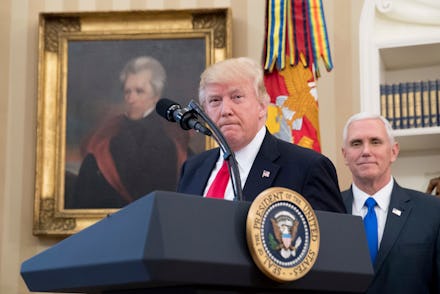Andrew Jackson: Donald Trump might want to rethink his opinion of our 7th president

It's easy to understand why President Donald Trump enjoys the comparisons between himself and Andrew Jackson.
Historians and political analysts, like Woodrow Wilson Center senior scholar Linda J. Killian, have described both Trump and Jackson as "brash," quick-tempered and "vulgar."
Like Trump, Jackson was a man who didn't take kindly to criticism. Unlike Trump, Jackson engaged in an estimated 100 gun duels with men he disagreed with and once killed a man for insulting his wife.
Like Trump, Jackson was viewed by many as the "people's president" and a "political outsider." For example, Jackson gave "common" — i.e. white — men the right to vote at a time when only wealthy white males who owned land were allowed to do so.
Unlike Trump, Jackson was a war hero whose toughness during the War of 1812 battlefield earned him the nickname "Old Hickory." While Trump has called himself "the king of debt," Jackson hated the very idea of owing money to others, curbing national spending and using federal land deals to pay off the national debt before defunding the country's national bank altogether.
But that's the extremely sanitized view of Jackson. Below are some less-convenient facts about our nation's seventh president.
The Trail of Tears
Jackson's most infamous historical atrocity was pushing Congress to adopt the Removal Act of 1830, which forced an estimated 125,000 Native Americans living in the nation's southeast states — Georgia, Tennessee, Alabama, North Carolina and Florida — to relocate to lands west of the Mississippi River.
Realizing they couldn't win a war with the United States, some native tribes reluctantly moved without added violence, but members of the Cherokee tribe had to be forcibly removed. More than 5,000 Cherokee died during the forced migration, primarily as a result of disease and starvation, according to the History Channel.
In an address to Congress, Jackson argued the Removal Act was in the natives' best interest and may one day help them "cast off their savage habits and become an interesting, civilized and Christian community."
Jackson also raised an adopted Native-American son after slaughtering the boy's family during an 1813 battle with the Creeks Native American tribe, according to excerpts from Dawn Peterson's book Indians in the National Family: Adoption and the Politics of Antebellum Expansion as published by Slate.
Advocating for slavery
Trump's belief that Jackson might have prevented the Civil War is ironic, given the late commander-in-chief's expressed views on the institution of slavery. Jackson certainly wasn't the only U.S. president to own slaves, but he may have been the most open and unapologetic slave-owning president.
A southerner from the Carolinas who later became an attorney before fighting in the War of 1812, Jackson was a wealthy slave owner of an estimated 150 slaves before his death, according to the Andrew Jackson Foundation website.
While in office, Jackson advocated for the expansion of slavery to U.S. western colonies. His support for slavery and injustices against Native Americans partly motivated his pending removal from the $20 bill in favor of Harriet Tubman.
"Stop the Runaway"
On Oct. 3, 1804, Jackson placed an ad in the Tennessee Gazette titled "Stop the Runaway." In the ad, republished by the Washington Post on Monday, Jackson offered a $50 reward — plus reimbursement for "reasonable" expenses — to anyone who caught his runaway "mulatto man slave."
The then-future president also promised an additional $10 "for every hundred lashes any person will give him, to the amount of three hundred."